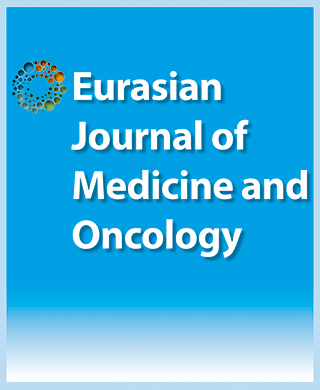

Hepatitis A Seroprevalence in Employees of a Public Hospital
Fidan Canan Celik Yagan1, Gulcin Gungor Olcum2, Sule Eren Cakar31Family Doctor, University of Health Sciences Umraniye Training and Research Hospital, Istanbul, Turkey, 2Department of Internal Medicine, University of Health Sciences Umraniye Training and Research Hospital, Istanbul, Turkey, 3Department of Infectious Diseases, University of Health Sciences Umraniye Training and Research Hospital, Istanbul, Turkey,
Objectives: The hepatitis A virus (HAV) is spread through the fecal-oral route. A vaccine is available for this infectious disease that primarily affects the liver, and which may have a more severe course in patients of advanced age. Hepatitis A outbreaks are often observed in places such as hospitals, schools, and long-term care centers. The aim of this study was to determine the seroprevalence in health workers within the risk group according to profession group. Methods: The anti-HAV immunoglobulin G (IgG) seropositivity of health workers at Zeynep Kamil Women's and Children's Disease Training and Research Hospital between January 1, 2012 and February 15, 2014 was evaluated retrospectively. A total of 169 participants were included in the study; 26 were male and 143 were female. Statistical significance was accepted at p<0.05. Results: In all, 109 (64.49%) of those included in the study were anti-HAV-IgG seropositive, while 60 (35.50%) were anti-HAV-IgG seronegative. Of the participants with an anti-HAV-IgG seropositive result, 92 (84.4%) were female and 17 (15.59%) were male. The HAV-IgG-positive rate was found to be significantly higher in the age group of those aged 35 years or more (p<0.05) in this study. Conclusion: HAV infection still ranks first among vaccine-preventable diseases frequently seen. Given the prevalence of the infection, its causing fulminant insufficiency, the large number of people affected in community-based outbreaks, the high risk of infection in some groups, and the cost of infection (hospitalization, loss of labor, prophylaxis after contact), the importance of vaccination is clear.
Cite This Article
Celik Yagan F, Gungor Olcum G, Eren Cakar S. Hepatitis A Seroprevalence in Employees of a Public Hospital. EJMO. 2017; 1(2): 92-95
Corresponding Author: Fidan Canan Celik Yagan



